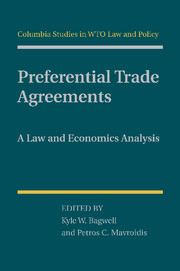Book contents
- Frontmatter
- Contents
- Contributors
- Introduction: The Law and Economics of Contingent Protection
- 1 Preferential Trading Agreements: Friend or Foe?
- The “Legalization” of GATT Article XXIV – Can Foes Become Friends?
- 2 Third-Country Effects of Regional Trade Agreements
- 3 Contingent Protection Rules in Regional Trade Agreements
- 3.1 Commentary on “Contingent Protection Rules in Regional Trade Agreements”
- 4 The Limits of PTAs
- 5 EU and U.S. Preferential Trade Agreements: Deepening or Widening of WTO Commitments
- Straightening the Spaghetti Bowl
- 5.1 Comments on “Beyond the WTO? Coverage and Legal Inflation in EU and U.S. Preferential Trade Agreements”
- 6 Labor Clauses in EU Preferential Trade Agreements – An Analysis of the Cotonou Partnership Agreement
- 7 Do PTAs Actually Increase Parties' Services Trade?
- 8 A Model Article XXIV: Are There Realistic Possibilities to Improve It?
- 8.1 Comments on “A Model Article XXIV: Are There Realistic Possibilities to Improve It?”
- Index
6 - Labor Clauses in EU Preferential Trade Agreements – An Analysis of the Cotonou Partnership Agreement
Published online by Cambridge University Press: 03 May 2011
- Frontmatter
- Contents
- Contributors
- Introduction: The Law and Economics of Contingent Protection
- 1 Preferential Trading Agreements: Friend or Foe?
- The “Legalization” of GATT Article XXIV – Can Foes Become Friends?
- 2 Third-Country Effects of Regional Trade Agreements
- 3 Contingent Protection Rules in Regional Trade Agreements
- 3.1 Commentary on “Contingent Protection Rules in Regional Trade Agreements”
- 4 The Limits of PTAs
- 5 EU and U.S. Preferential Trade Agreements: Deepening or Widening of WTO Commitments
- Straightening the Spaghetti Bowl
- 5.1 Comments on “Beyond the WTO? Coverage and Legal Inflation in EU and U.S. Preferential Trade Agreements”
- 6 Labor Clauses in EU Preferential Trade Agreements – An Analysis of the Cotonou Partnership Agreement
- 7 Do PTAs Actually Increase Parties' Services Trade?
- 8 A Model Article XXIV: Are There Realistic Possibilities to Improve It?
- 8.1 Comments on “A Model Article XXIV: Are There Realistic Possibilities to Improve It?”
- Index
Summary
Introduction
Over the past fifteen years, the promotion of labor rights has moved from the periphery to the center of the European Union's (EU's) international relations agenda. From relatively cautious beginnings under the European Economic Community (EEC) Treaty, a linkage has progressively evolved between, on the one hand, the EU's interconnected trade, development, and foreign policies and, on the other hand, the obligations it expects from partner countries regarding respect for human rights and observance of international labor standards. As the enlarged EU has sought to exert its growing influence as a “global actor,” so this linkage has become inextricable and a feature of what the EU wishes to present as a coherent strategy designed to tilt the axis of globalization toward its “social dimension.”
Section 2 of this chapter outlines the main reasons for the EEC's initial caution in international relations and proceeds to identify several factors that have contributed to the emergence of a strict requirement of human rights conditionality as an “essential element” of preferential trade agreements (PTAs) and provided a basis for separate clauses reaffirming the parties' commitment to specified international labor standards. To explore the practical application of this strategy, Section 3 analyzes the most prominent example of a transformed PTA, the Cotonou Partnership Agreement (CPA), signed jointly in 2000 by the EU and its member-states and seventy-eight members of the African, Caribbean, and Pacific Group of States (ACP).
- Type
- Chapter
- Information
- Preferential Trade AgreementsA Law and Economics Analysis, pp. 180 - 209Publisher: Cambridge University PressPrint publication year: 2011
- 4
- Cited by



